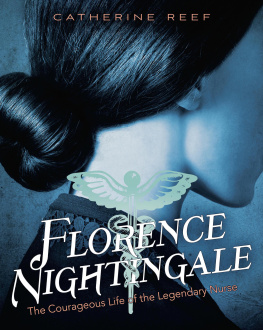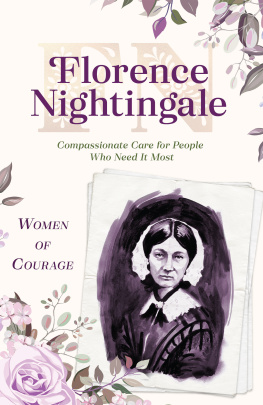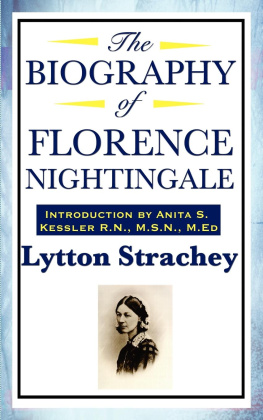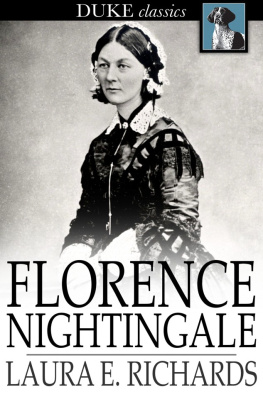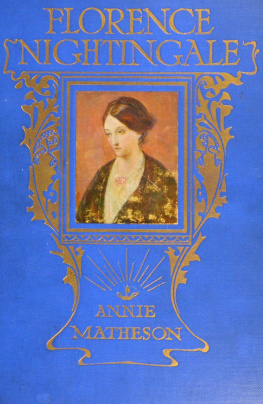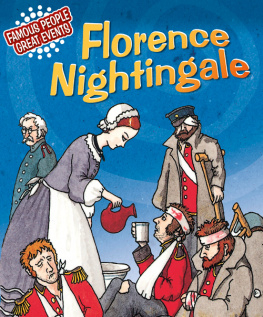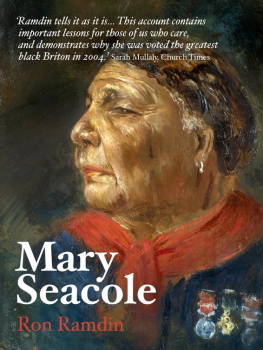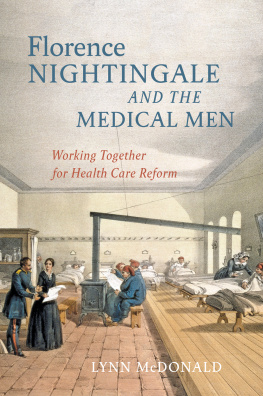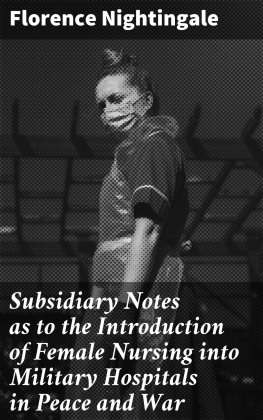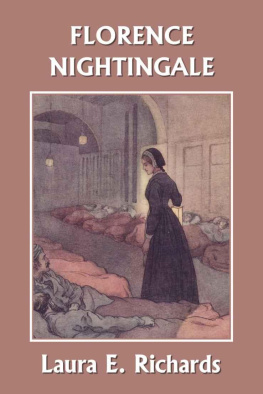C LARION B OOKS
3 Park Avenue, New York, New York 10016
Copyright 2016 by Catherine Reef
All rights reserved. For information about permission to reproduce selections from this book, write to or to Permissions, Houghton Mifflin Harcourt Publishing Company, 3 Park Avenue, 19th Floor, New York, New York 10016.
Clarion Books is an imprint of Houghton Mifflin Harcourt Publishing Company.
www.hmhco.com
Front cover photographs 2016 by Emma Goulder/Trevillion Images (portrait) and Shutterstock (Emblem)
Cover design by Sharismar Rodriguez
The Library of Congress has cataloged the print edition as follows:
Names: Reef, Catherine, author.
Title: Florence Nightingale : the courageous life of the legendary nurse / Catherine Reef.
Description: Boston : Clarion Books, [2017] | Audience: Ages 12+.
Includes bibliographical references and index.
Identifiers: LCCN 2015045606 | ISBN 9780544535800 (hardcover) Subjects: LCSH: Nightingale, Florence, 18201910Juvenile literature. | NursesEnglandBiographyJuvenile literature. Classification: LCC RT37.N5 R44 2017 | DDC 610.73/092dc23 LC record available at http://lccn.loc.gov/2015045606
eISBN 978-0-544-53582-4
v1.1016
For Sara Hoffee
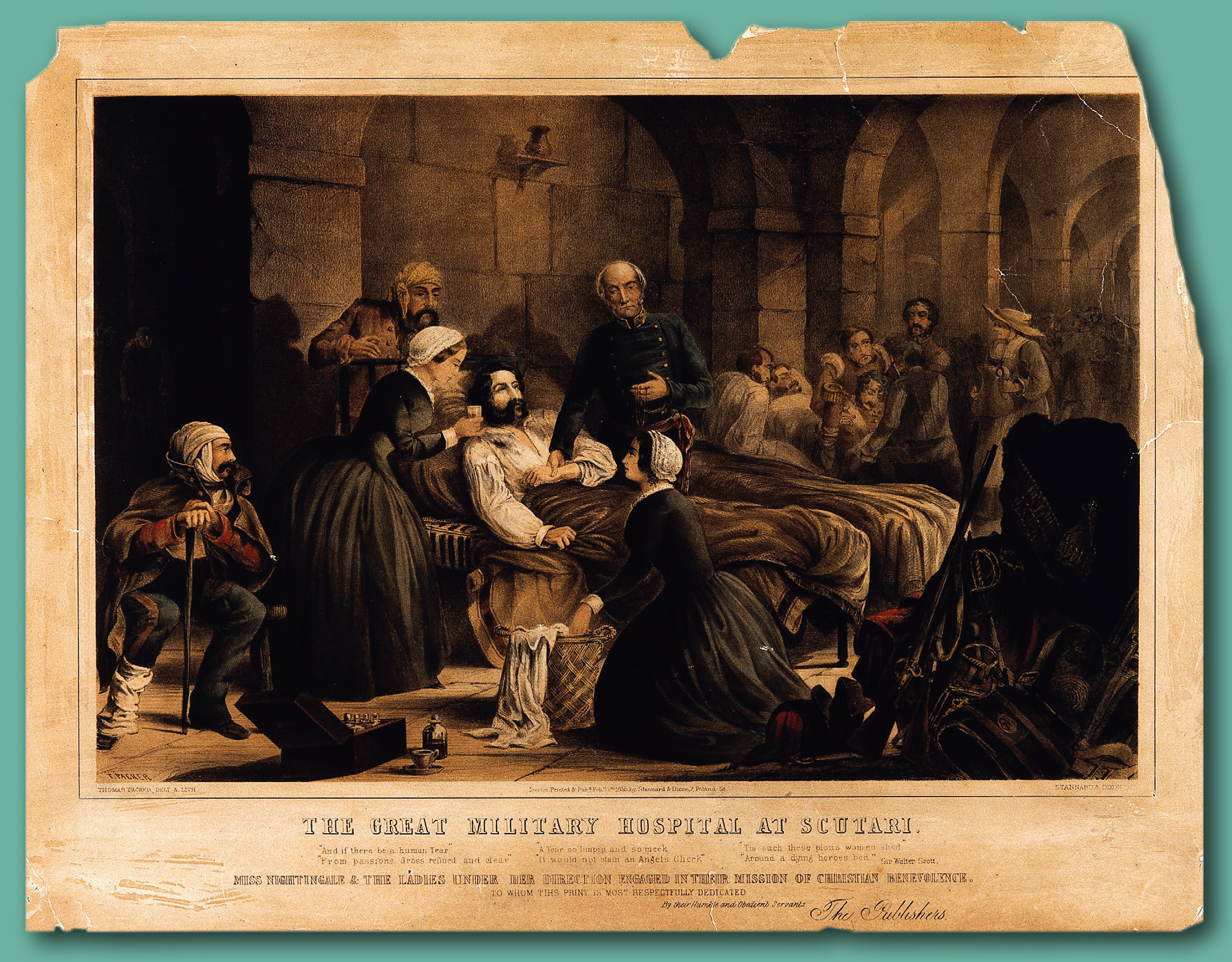
Florence Nightingale (standing) and another nurse comfort a dying soldier at the Barrack Hospital.
P ROLOGUE
The Night Gallery
T HINGS happening at night had the look of old paintings. Candles and handheld lamps cast golden light on people quietly busy at their labor. Foreheads, cheeks, and hands glowed softly as if lit from within. Deep-hued garments fell away in shadow, while everything beyond the circle of light vanished into blackness.
Beautiful from a distance, the scenes were heartbreaking when viewed up close. In one, a British soldier whose arm had been blown off lay on a cracked stone floor. A chaplain and a medical officer hovered nearby as a woman dressed his wound. Wars work, said the chaplain, is altogether an accursed work. On another night, the same nurse bound a stump, all that was left of a second soldiers leg, as a nun in a long veil sponged away blood.
The nurse giving aid on this dark night was Florence Nightingale. Thirty-four years old, tall and slender, she wore her reddish-brown hair tucked into a white cap. She had a face not easily forgotten, noted the chaplain. It was pleasing in its smile, with an eye betokening great self possession, and giving when she wishes, a quiet look of firm determination to every feature. Nightingale needed that determinationthat grit. She had come to this place, the Barrack Hospital at Scutari, in northwest Turkey, as part of a great experiment. For the first time, the British army was employing female nurses in its wartime hospitals, and Nightingale was the nurse in charge.
It was 1854, and the two wounded soldiers were many miles from home. They held a different set of pictures in their minds: cavalry brigades riding toward one another across a bleak landscape, their bayonets raised; the chaos of battleswords slashing, cannon firing, men tumbling to the ground; then, later, fallen horses and crushed wagons, bodies sprawled on hillsides with dead eyes staring at the sun.
Along with the Turkish and the French, the British were fighting the Crimean War. They were battling the Russians, who wanted greater influence on the Balkan Peninsula of southeast Europe. The brutal war was costing hundreds of thousands of lives. Men were killed in action, but many more died later from infection or disease. Some of the soldiers in Nightingales care had waited days for a boat to carry them from camp or battlefield across the Black Sea to Scutari. After reaching the pier, they were loaded into carts or strapped onto mules to go the last quarter mile to the Barrack Hospital, crying out at every bump in the rough road.
Nightingale had arrived to find the hospital in a shameful state. Miles of sick and wounded men lined the corridors. In row after horrific row, they lay on the floor or on thin mattresses held up by rotting wood. Their foul blankets teemed with lice, and the stench of overflowing latrines poisoned the air. Meals were inedible and often served raw. That this is the Kingdom of Hell no one can doubt, Nightingale declared. She and her nurses got busy, bringing order and cleanliness to the hospital and hope to the suffering men.
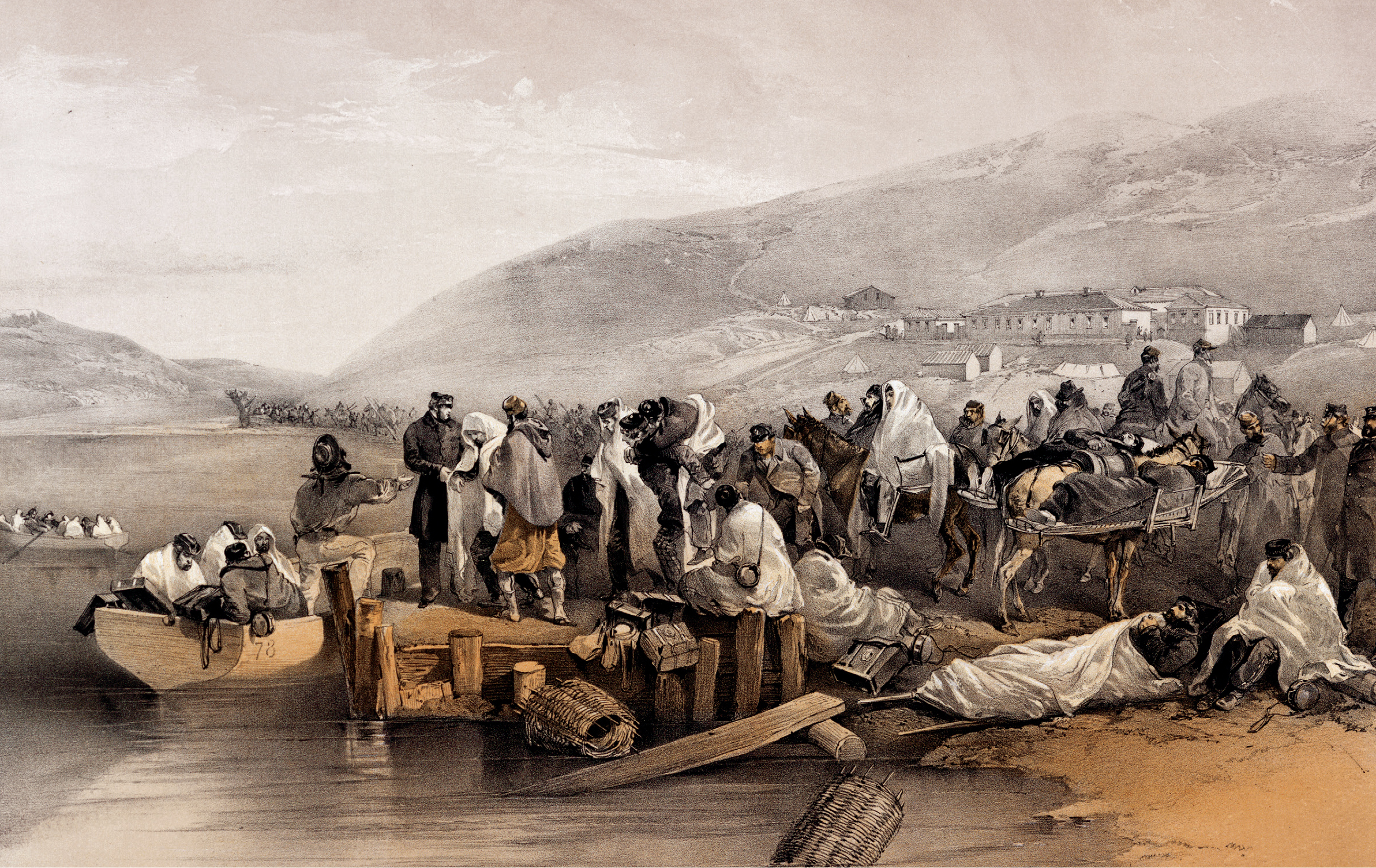
Sick and wounded British soldiers wait to board a ship that will carry them to the hospital at Scutari.
Florence Nightingales work in Scutari earned her devotion from those at home and made her famous throughout the world. Her admirers wrote songs and poems about her. They bought Florence Nightingale statuettes to place on their mantels. They hung fanciful pictures of Nightingale visiting soldiers beds, always carrying a lantern. People called her the Lady with the Lamp.
Even today, Florence Nightingale is remembered for her service in the Crimean War. Yet wartime work took up less than two years of her life, and many of her significant accomplishments came later. She returned to England in 1856 with the coming of peace. Her health had been shattered by the war, but she kept working to bring people better medical care and further the training of nurses. Her efforts paved the way for the modern profession of nursing. With so much to do, she drove herself and others hard, and she had no patience for delays. She always talks as if her time were short, said Dr. John Sutherland, a loyal colleague, yet she was to live a long time.
She was also a daughter and sister who was often at odds with those who loved her. She had pushed hard against her familys objectionsand societys rigid rulesto create the life she felt called to live. Although a man could move freely in the world in the mid-nineteenth century, home was an English ladys realm. She was expected to be graceful, delicate, and virtuous and to make home a mans welcoming refuge. She obeyed her husband if she was married or her father if she remained single, regardless of her age.
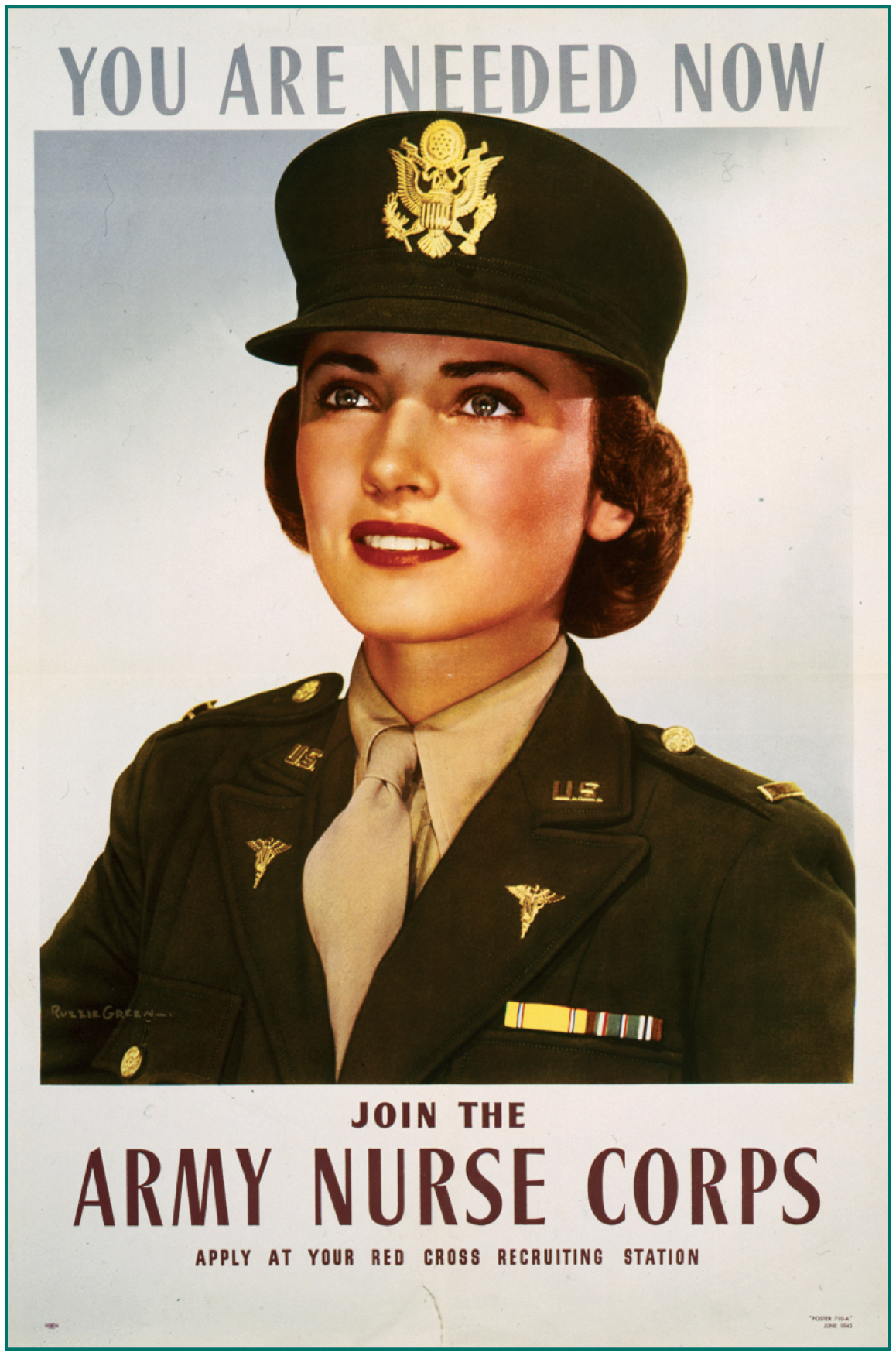
A 1943 poster asks American women to enlist in the U.S. Army Nurse Corps during World War II. By the twentieth century, having female nurses serve in wartime hospitalssomething controversial in Nightingales dayhad become standard.
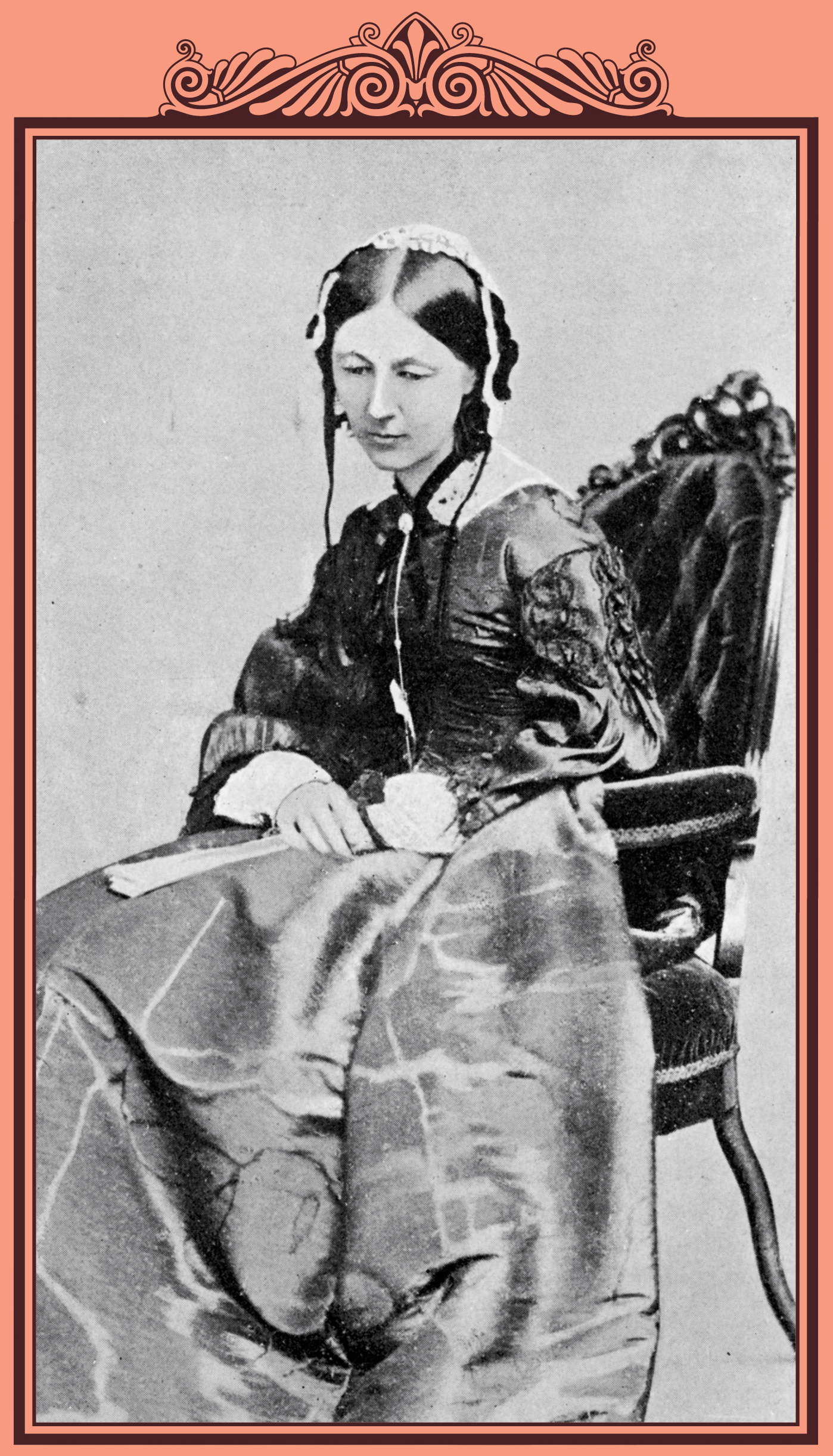
Florence Nightingale defied her familys expectations to pursue a nursing career. This photograph was taken in 1853 or 1854.
Nightingale had dared to ask, Why have women passion, intellect, moral activitythese threeand a place in society where no one of the three can be exercised? Every time a person gave up a dream for social approval, the world is put back, she believed.
Florence Nightingale wanted the world to move forward. She thought that in nursing, as in every human activity, constant progress is the law of life.
C HAPTER 1

